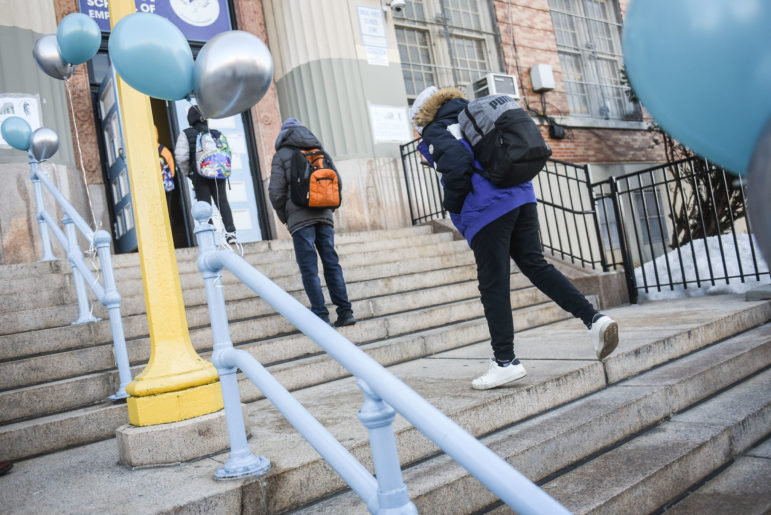The series “We Are New York,” produced by the Mayor’s Office of Adult Education and CUNY, begins its second airing Aug. 28 on cable Channel 74 at 10 p.m. Friday and 1 p.m. Sunday, and on broadcast and cable Channels 25 and 22 at 4 p.m. Saturday and 7:30 a.m. Sunday.
“We Are New York” is a new television series for and about immigrant New Yorkers, each episode a civics and language lesson masquerading as an upbeat telenovela. Take the first episode, described on the show’s website as “a romantic comedy about financial empowerment, saving money and banking in the Big Apple.”
Jorge is a puppy-eyed waiter, Sophie a lovely manicurist. Each thinks the other is rich. If this were a reality show, we’d expect them to be backstabbing each other by the first ad break. Instead, the pair not only falls in love, but learns to manage a budget. The last scene finds them enjoying a frugal picnic in Central Park:
Jorge: Are you sure you wouldn’t prefer a fancy restaurant?
Sophie: No. Are you sure you wouldn’t prefer that?
Jorge: I didn’t even have a bank account. I just got one two days ago.
Sophie: My friend at work helped me open a bank account too.
Jorge: Maybe we don’t have a lot of money. But…
Sophie: At least we have good friends.
“Desperate Housewives,” it’s not.
“We Are New York” is geared towards the 1 million-plus adult New Yorkers with limited English proficiency, many of whom are on waiting lists for publicly-funded English as a Second Language classes. The series, produced by the Mayor’s Office of Adult Education and CUNY with funds from a federal community development grant, debuted this June and just finished its first run on NYC TV-25. Each of the nine episodes conveys a quality of life message—how to manage diabetes, quit smoking, report domestic violence, prepare for a parent-teacher conference—with easy-to-follow plots, subtitles, and immigrant actors speaking slowly in their new tongue. The English in this show is functional, idiomatic but straightforward, and spoken by people with accents.
“Our audience appreciates that—you see immigrants learning English from other immigrants, not some mainstream authority,” says Anthony Tassi, director of the Mayor’s Office of Adult Education. “In almost every episode, you have a character interrupting an official figure to take control of the language, which is critically important. As an immigrant, you have to develop that self confidence to say ‘please speak slower, please repeat.’”
Because NYC-25 doesn’t track show ratings, Tassi doesn’t know how many people tuned in to the show’s first run, though he says the website receives thousands of hits a week. A second run of the entire series begins this Friday. ESL teachers report that their students give positive marks to the show’s message of self-empowerment and advice on getting by in the city. “We Are New York” is also strikingly well-produced, with a global soundtrack and sweeping shots of immigrant enclaves like Brighton Beach and Washington Heights.
“The episodes address issues that matter to the students, in a way that’s easy to understand and humorous,” says Lizelena Iglesias, a teacher at the nonprofit group Make the Road New York, which serves mostly Latin American immigrants in Brooklyn, Queens and Staten Island. The Cuban-born Iglesias screened the show with her class earlier this year, and later used the “Love and Money” episode quoted above to teach her students how to open a bank account. “They’re learning and they’re also having fun, which is crucial.”
The same episode was inspiration for a teacher at CAMBA, the Brooklyn-based multiservice agency, to launch a class discussion on dating practices in the United States, and how they differ from those in students’ native countries. In another class that saw the episode, a local bank manager gave a presentation on financial planning. The Mayor’s Office has encouraged such creativity with mini-grants for teachers to develop curricula around specific episodes. The lesson plans, along with workbooks and DVDs of the program, will be available for wider distribution later this fall.
The producers of “We Are New York” also aim to help stretch the adult education dollar, because the demand for English as a Second Language instruction dwarfed the approximately 75,000 publicly-funded classroom seats available this year. Major ESL centers like the Queens Library and LaGuardia Community College, as well as smaller community organizations like CAMBA and Make the Road, regularly turn away aspiring learners or put them on waiting lists. Tassi envisions such students going to volunteer-led discussion groups in their neighborhoods, where “We Are New York” episodes will help facilitate English discussion. The idea will get a chance to flourish this fall, when ESL classes are back in session and the Mayor’s Office will advertise the series more aggressively—though they may find it a challenge to tear faithful viewers from the new season of “America’s Next Top Model” or “Mañana Es Para Siempre.”








